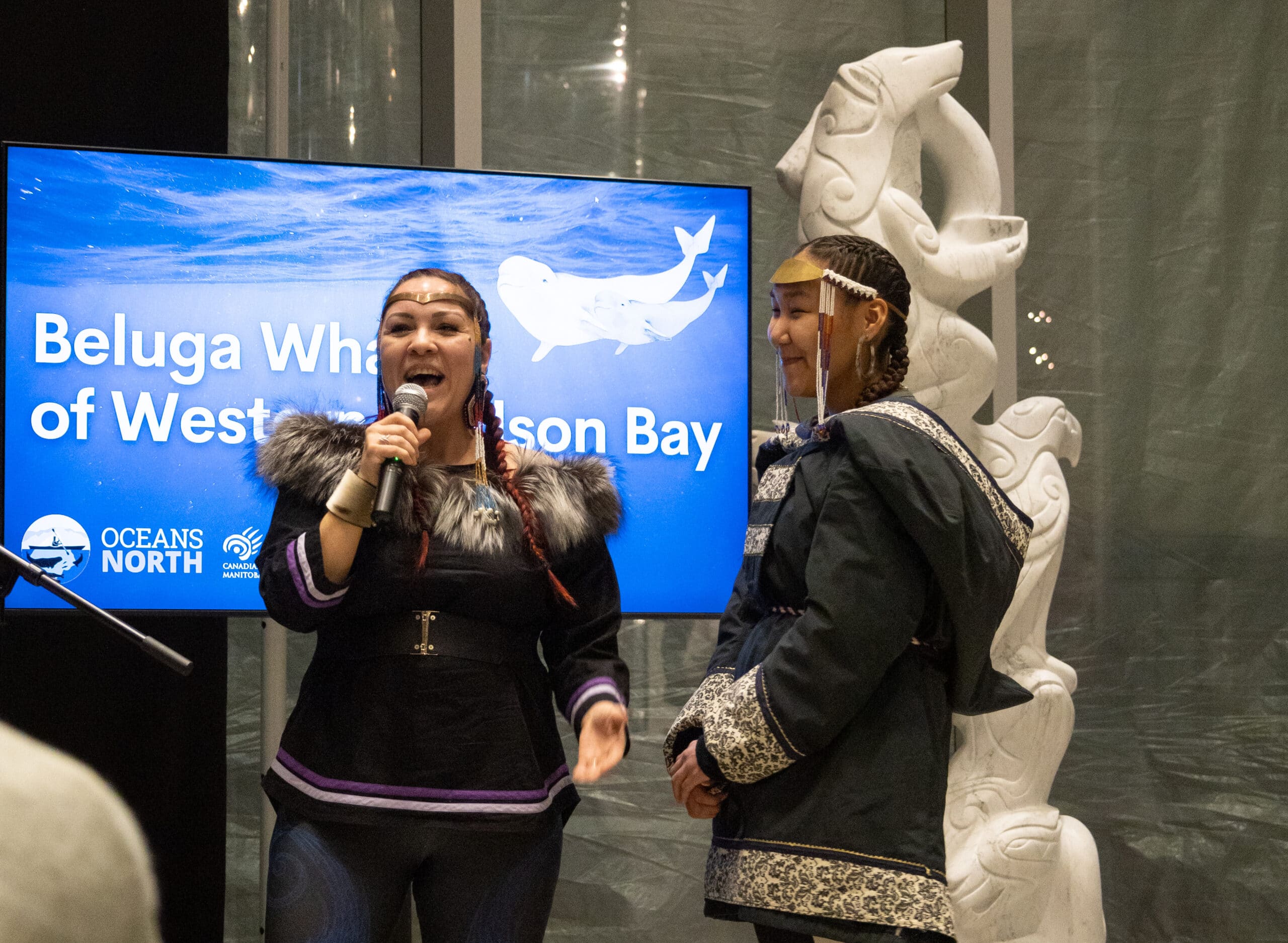
WRITTEN BY RILEY CHERVINSKI
Canada must do a better job of protecting beluga whales and the best way to do that is to establish a marine protected area in Hudson Bay, Oceans North and the Canadian Parks and Wilderness Society Manitoba chapter said Wednesday.
The groups hosted a gala at the Qaumajuq Inuit Art Gallery on January 25, 2023, to draw attention to the need to protect beluga whales.
More than 90 people attended the event including: Inuit elders and community members; representatives from Parks Canada; community members from Fox Lake Cree Nation and York Factory First Nation; researchers from the University of Manitoba and the Assiniboine Park Conservancy; and provincial government representatives.

Nearly 100 people came out to the Qaumajuq Inuit Art Gallery to show support for, and learn more about, Canada’s beluga whales.
More than 6,000 people have sent letters to the federal government urging it to protect Western Hudson Bay.
“As Arctic sea ice melts, the belugas of Western Hudson Bay are becoming increasingly vulnerable to the impacts of climate change, industrial development and pollution,” said Ron Thiessen, Executive Director of the Canadian Parks and Wilderness Society.
“We’re calling on the federal government to take action to protect this healthy beluga population as part of its commitment to conserving 30 percent of Canada’s land and water by 2030.”
Cultural and scientific perspectives on the importance of beluga whales were shared by folks at the event, including speeches by Elder Nellie Taptaqut Kusugak and Kristin Westdal, Science Director for Oceans North.
“The work that we’re doing here to try and better understand these animals from a scientific perspective is really giving us an idea of what habitat needs protection and advance the changes to protect beluga whales now and in the future,” said Kristin Westdal during her presentation of recent research on the behaviour of beluga whales in the presence of whale-watching vessels.
The federal government identified southwestern Hudson Bay for protection as a National Marine Conservation Area (NMCA) in 2017. However, the process has stalled, and the next step of a feasibility assessment has yet to be launched.
Creating an NMCA would help protect both belugas whales and the livelihoods of people who rely on them, including whale-watching tour operators in Churchill and Inuit harvesters further north.
It would also protect other important marine species including polar bears, seals and millions of seabirds. National Marine Conservation Areas also uphold Indigenous rights and provide economic benefits such as jobs and infrastructure.
In Manitoba, a healthy coast supports the northern tourism industry. Pre-pandemic, Churchill welcomed an estimated 15,000 visitors annually. In 2015, tour operators estimated the economic value of whale-watching alone at $6 million a year.

Hilu Tagoona, Senior Arctic Advisor with Oceans North spoke at the January 25 event
“Federal protection would be a clear win for the province. It comes with federal investment, tools, and resources to protect and manage a vital marine area. It will help create sustainable jobs in the North,” Thiessen added.
“Done right, it would be based on science, Indigenous knowledge, local knowledge, and participation, all while affirming Indigenous rights. This is important for a region such as western Hudson Bay, where observable effects of climate change include a faster loss of ice than in most parts of the Arctic.”
The case for habitat protection in Western Hudson Bay is strong, CPAWS Manitoba and Oceans North said.
An estimated 55,000 beluga whales – one-third of the world’s population – migrate into the Churchill, Seal, and Nelson river estuaries in summer. It’s the greatest concentration of beluga whales on the planet.
170 species of birds are also found in the region, including some that are hard to spot anywhere else. With longer ice-free periods in the Arctic sea, beluga whales are becoming more vulnerable to increased ship traffic, hydroelectric development and predation from orca whales.
“Scientific studies are making us keenly aware of the wide scope of services provided by oceans and coasts,” said Christopher Debicki. Vice-President, Policy Development and Counsel at Oceans North.
“Healthy oceans stabilize and slow changes to marine ecosystems that sequester large amounts of carbon, such as kelp, seagrass beds, and the seafloor itself. Protecting these marine areas can help mitigate the impacts of climate change on both marine mammals and human communities.”
Watch Raw Footage of the Beluga Gala Event
–Thanks in part to the National Audubon Society for making this blog possible. CPAWS greatly appreciates its support of our boreal conservation efforts in Manitoba–
